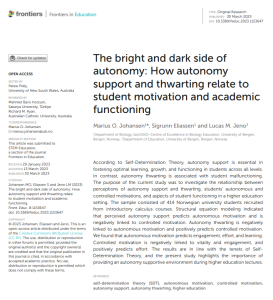Research article on student motivation in higher education
According to Self-Determination Theory, autonomy support is essential in fostering optimal learning, growth, and functioning in students across all levels. In contrast, autonomy thwarting is associated with student malfunctioning. The purpose of the current study was to investigate the relationship between perceptions of autonomy support and thwarting, students’ autonomous and controlled motivations, and aspects of student functioning in a higher education setting. The sample consisted of 414 Norwegian university students recruited from introductory calculus courses. Structural equation modeling indicated that perceived autonomy support predicts autonomous motivation and is negatively linked to controlled motivation. Autonomy thwarting is negatively linked to autonomous motivation and positively predicts controlled motivation. We found that autonomous motivation predicts engagement, effort, and learning. Controlled motivation is negatively linked to vitality and engagement, and positively predicts effort. The results are in line with the tenets of Self-Determination Theory, and the present study highlights the importance of providing an autonomy supportive environment during higher education lectures.
Reference and link to the article
Johansen M.O., Eliassen S. and Jeno L.M. (2023). The bright and dark side of autonomy: How autonomy support and thwarting relate to student motivation and academic functioning. Front. Educ. 8:1153647. doi: 10.3389/feduc.2023.1153647



